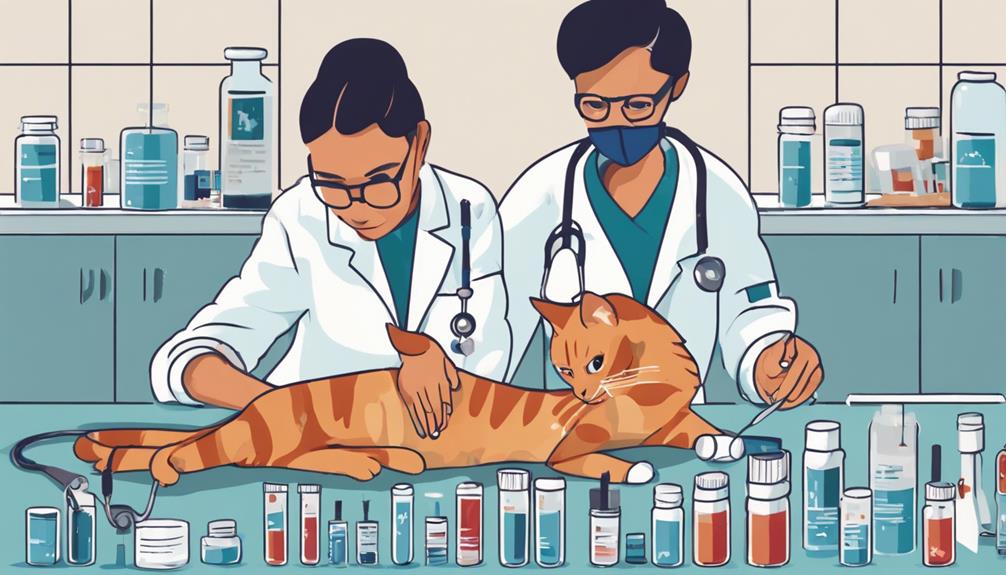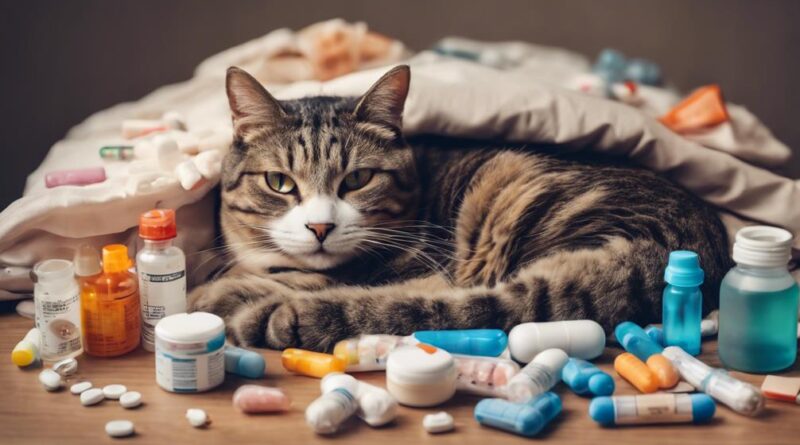Top 10 Tips to Combat Feline's Most Dangerous Diseases
Hey there, cat parent!
Cats are notorious for their independent nature, but when it comes to safeguarding your feline friend against potential health risks, being proactive is key.
From understanding common diseases to implementing preventative measures, this guide will equip you with essential tips to keep your cat healthy and happy.
So, are you ready to take charge of your cat's well-being and arm yourself with the knowledge to combat feline's most dangerous diseases?
Understanding Common Cat Diseases
To comprehend the health risks your feline companion faces, you must grasp the common cat diseases that can affect them. Feline health is paramount in ensuring your furry friend leads a long and healthy life. One of the key aspects of maintaining feline health is disease prevention. By understanding the common cat diseases that pose a threat to your pet, you can take proactive measures to keep them safe and healthy.
One prevalent disease among cats is feline leukemia virus (FeLV). This viral infection weakens the immune system, making cats more susceptible to other illnesses. FeLV is often transmitted through close contact with infected cats, so keeping your feline indoors and away from potentially infected animals can help prevent the spread of this disease.
Another common cat disease is feline immunodeficiency virus (FIV), which is similar to HIV in humans. FIV attacks the immune system, leaving cats vulnerable to various infections. Preventing this disease involves keeping your cat away from fights with unknown cats, as FIV is often transmitted through bite wounds.
Understanding these common cat diseases is crucial in safeguarding your feline companion's well-being. By prioritizing disease prevention and taking necessary precautions, you can help your cat live a healthier and happier life.
Importance of Regular Veterinary Check-ups
Regular veterinary check-ups play a vital role in safeguarding your cat's health and well-being. These routine visits allow your veterinarian to detect any potential health issues early on, ensuring your feline friend receives the necessary care to stay healthy and happy. Here are some key reasons why regular veterinary check-ups are crucial for your cat:
- Dental Health: Regular check-ups help monitor your cat's dental health, allowing for early detection and treatment of dental issues such as gum disease or tooth decay.
- Parasite Prevention: Through routine check-ups, your veterinarian can assess your cat's risk of parasites like fleas, ticks, and worms. They can recommend preventative measures to keep your cat parasite-free.
- Early Disease Detection: Regular visits enable early detection of underlying health conditions such as kidney disease, diabetes, or cancer. Early intervention can improve treatment outcomes and your cat's quality of life.
- Vaccination Updates: Veterinarians use check-ups to ensure your cat's vaccinations are up-to-date, protecting them from common infectious diseases.
Implementing Preventative Measures
Considering your feline companion's well-being, taking proactive steps to implement preventative measures can significantly enhance their overall health.
One key aspect of preventative care is providing environmental enrichment. Cats thrive in stimulating environments, so ensure they've access to toys, scratching posts, and hiding spots to keep them mentally and physically active. Environmental enrichment can reduce stress, prevent behavioral issues, and promote overall well-being in your furry friend.
In addition to environmental enrichment, behavioral modifications play a crucial role in preventing diseases in cats. For instance, if your cat displays destructive behavior or aggression, working with a professional trainer or behaviorist can help address these issues before they escalate into health problems. Simple changes like establishing a routine, providing positive reinforcement, and creating a safe space for your cat can go a long way in preventing potential health issues.
Recognizing Symptoms Early
Early recognition of symptoms in your feline companion is crucial for prompt intervention and effective treatment. Keeping a close eye on your cat's well-being can help catch potential health issues early on. Here are some key points to assist you in recognizing symptoms promptly:
- Early Detection: Regularly monitor your cat's vital signs such as temperature, heart rate, and respiratory rate. Any significant changes could indicate an underlying problem.
- Observing Symptoms: Be attentive to changes in your cat's behavior, appetite, and litter box habits. These can be early indicators of health issues.
- Health Monitoring: Schedule regular check-ups with your veterinarian to ensure your cat's overall health is being monitored consistently.
- Prompt Action: If you notice any unusual symptoms or behaviors, don't hesitate to seek professional advice. Early intervention can make a significant difference in treatment outcomes.
Proper Nutrition for Disease Prevention
To maintain your feline companion's health and prevent diseases, ensuring proper nutrition is essential. Providing a well-balanced diet is crucial for your cat's overall well-being. Make sure to offer high-quality cat food that meets their specific nutritional needs. Look for products that are labeled as complete and balanced to ensure they receive all the necessary nutrients. Additionally, consider incorporating nutritional supplements into their diet if recommended by your veterinarian. These supplements can help address any deficiencies and support your cat's immune system.
Dietary changes can also play a significant role in disease prevention. If your cat has specific health concerns, such as obesity or kidney disease, adjusting their diet accordingly can help manage these conditions and reduce the risk of related diseases. Consult with your vet to determine the best dietary plan for your cat based on their individual needs. Remember to introduce any dietary changes gradually to avoid upsetting your cat's stomach.
Managing Stress in Cats
How can you identify signs of stress in your cat and effectively manage it to promote their well-being? Stress management is crucial for your feline friend's health and happiness. By recognizing behavioral changes and providing environmental enrichment, you can help alleviate stress and improve their quality of life.
Here are some tips for managing stress in cats:
- Monitor Behavioral Changes: Keep an eye out for signs such as excessive grooming, hiding, aggression, or changes in appetite. These can indicate that your cat is experiencing stress and needs support.
- Create a Stimulating Environment: Provide your cat with plenty of opportunities for mental stimulation. Interactive toys, scratching posts, and window perches can help keep them engaged and entertained, reducing stress levels.
- Establish a Routine: Cats thrive on routine, so try to keep feeding, playtime, and sleep schedules consistent. Predictability can help reduce anxiety and create a sense of security for your furry companion.
- Offer Safe Spaces: Ensure your cat has access to quiet, secluded areas where they can retreat and relax. Elevated spaces like cat trees or shelves can provide a sense of security and a place to observe their surroundings.
Vaccination Protocols for Cats

Considering the safety and health of your feline companion, ensuring they receive the appropriate vaccinations according to recommended protocols is essential. Vaccine schedules play a crucial role in protecting your cat from various infectious diseases. Kittens typically require a series of vaccinations starting at around 6-8 weeks of age, with booster shots given at specific intervals to maintain immunity. Adult cats also need regular vaccinations to ensure continued protection.
It's important to understand the effectiveness of vaccines in preventing diseases. Vaccinations work by stimulating the immune system to produce antibodies against specific pathogens, helping the body recognize and fight off these diseases more effectively. Contrary to some immunization myths, vaccines are generally safe and have been instrumental in reducing the prevalence of deadly diseases in cats.
Knowing the facts about vaccination protocols can help dispel any misinformation. Your veterinarian can provide guidance on which vaccines are necessary based on your cat's lifestyle, environment, and risk factors. By staying up-to-date with vaccinations, you can help safeguard your feline friend's well-being and contribute to the overall health of your pet community. Regular check-ups with your vet will ensure that your cat receives the necessary vaccinations at the appropriate times, keeping them protected from potentially life-threatening illnesses.
Seeking Immediate Veterinary Care
In case of a medical emergency with your cat, promptly seek veterinary care to ensure timely treatment and the best possible outcome. When faced with emergency situations involving your feline friend, every minute counts. Here are some key points to consider when seeking critical care for your cat:
- Call Ahead: Inform the veterinary clinic about the situation before arriving, so they can prepare for your cat's arrival and provide immediate assistance upon reaching the facility.
- Stay Calm: Your cat can pick up on your emotions, so remaining calm can help keep them calm too, making it easier for the vet to assess and treat them.
- Transport Safely: Use a secure carrier to transport your cat to the vet to prevent further injury or stress during the journey.
- Follow Vet's Instructions: Upon reaching the clinic, follow the veterinarian's instructions carefully to ensure your cat receives the appropriate care and treatment without delay.
Frequently Asked Questions
Can Indoor Cats Get Diseases as Well, or Are They Mainly a Concern for Outdoor Cats?
Indoor cats can still get diseases, even though they're mostly inside. Vaccination plays a crucial role in indoor cat health by preventing common feline diseases.
Maintaining a clean and stress-free home environment is key to disease prevention for indoor cats. Regular vet check-ups and vaccinations help keep indoor cats healthy and protected.
Are There Any Natural Remedies or Supplements That Can Help Prevent Common Feline Diseases?
Yes, there are herbal remedies and dietary supplements that can aid in the natural prevention of common feline diseases. Holistic care for your cat can include incorporating natural supplements like probiotics, omega-3 fatty acids, and herbal remedies such as echinacea or licorice root.
These can help boost your cat's immune system and overall health. Remember to consult with your veterinarian before introducing any new supplements to your cat's diet.
How Can I Help My Cat Manage Stress Levels, Especially in Multi-Cat Households?
To help your cat manage stress levels in a multi-cat household, consider behavior modification techniques and environmental enrichment.
Providing hiding spots, vertical space, and interactive toys can reduce tension. You can also use feline pheromones to create a calming atmosphere.
Ensure each cat has its own resources like food, water, and litter boxes to minimize competition.
Regular play sessions and positive reinforcement can also promote relaxation and harmony among your feline companions.
Are There Any Specific Breeds of Cats That Are More Prone to Certain Diseases?
Certain breeds of cats exhibit genetic predispositions to specific diseases. For example, Siamese cats are more prone to respiratory issues, while Maine Coons can have heart problems. Environmental factors also play a role in disease development.
Providing a stress-free environment and regular vet check-ups can help mitigate these risks. Being aware of your cat's breed and potential health concerns can aid in early detection and management of any issues that may arise.
How Often Should I Clean My Cat's Living Space to Prevent the Spread of Diseases?
To prevent disease spread, clean your cat's living space regularly. Regular grooming benefits your cat's health by reducing shedding and preventing skin issues. Proper litter box maintenance is crucial for hygiene and preventing infections.
Aim to scoop waste daily, change litter weekly, and clean the box with mild soap and water regularly. By staying on top of cleaning tasks, you can create a healthy environment for your feline friend.
Conclusion
To keep your feline friend healthy and happy, make sure to stay on top of their veterinary check-ups, vaccinations, and nutrition.
By recognizing symptoms early and seeking immediate veterinary care when needed, you can combat the most dangerous diseases that affect cats.
Remember to manage your cat's stress levels and implement preventative measures to keep them safe and thriving for years to come.
Your furry companion deserves the best care possible, so be proactive in protecting their health.
